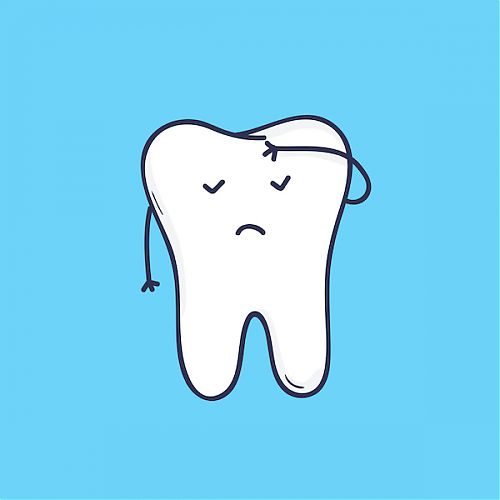Wisdom teeth – gotta love ‘em, don’t you? Said nobody ever! The wisdom teeth are the ones that cause the most problems, worldwide. In fact, there is archeological evidence of an impacted wisdom tooth as early as 13,000 years ago, in the skeleton of a stone age woman from France.
So what is a wisdom tooth, and why do they cause so much problems until you get your dentist to do a wisdom tooth extraction?
The wisdom tooth is the furthest-in tooth in your mouth, the one right at the back. We each have four, two on top, and two on the bottom. They are molars. The molars are the chewing teeth, designed to break down food by grinding and chewing. The teeth nearer the front, in contrast, are designed to tear off food, which is then dealt with by the back teeth – perhaps the world’s first production line?
We evolved to have twelve molars: three on the top left, three on the top right, and three beneath those on both sides. According to anthropologists these were the evolutionary answer to our ancestor’s early rough diet – lots of leaves, roots, nuts, and tough meat. But around 10,000 years ago our diet changed, with the introduction of agriculture. Our foods became softer and easier to masticate. And evolution has yet to catch up.
The diet of 10,000 years ago was hard work, and all the chewing stimulated growth of the jaw bone. We all had the protruding chins of action heroes and neanderthals. Then we started chewing less, and our jaws lost the stimulation to develop. Over time the lack of forward growth in the jaw led to the back four teeth – the wisdom teeth – being squeezed out. When the back tooth does not have room to develop properly, we get an impacted wisdom tooth.
The eruption
The appearance of your wisdom teeth goes by the dramatic term The Eruption. They literally erupt through the jaw – often painfully – generally in our teen years or early twenties. The years we gain our wisdom, hence the name.
But if our jaw has not developed enough the wisdom teeth may get stuck, or impacted, against other teeth because there is not enough space for them to come through normally. This pressure can lead to tooth decay. And when wisdom teeth are partially erupted through the gum, it can cause inflammation and infection, leading to pain.
The swollen wisdom tooth can make a wisdom tooth removal advisable.
The experts at Cork Dental Care will work hard to make sure this procedure is painless, and that you are properly medicated during your recovery. You will have to be careful with what you eat for a few days though!
Swollen Wisdom Tooth
We refer to a swollen wisdom tooth, though in reality the tooth does not swell. The surrounding gum tissue can become inflamed and swollen though. When the tooth erupts, it might be pressed too hard against neighbouring teeth. Or it might erupt at an angle, due to lack of space on the jaw, pushing it up into the neighbouring tooth, and leaving a space where food or bacterial can lodge.
Often good dental hygiene can help. If you can dislodge the food or source of irritation, the problem can right itself. Antibacterial mouthwashes will be useful. And sometimes you might need to use an ice-pack on your jawline, or take some anti-inflammatory tablets, on medical advice. But if the problem persists, you might have to consider a wisdom tooth removal. Some people, on advice from their dentist, opt for a preventative wisdom tooth extraction to head off problems before they arise.
Wisdom Tooth Removal Cost
Wisdom tooth extraction cost will vary according to how complicated it is to get at the tooth, and how close it is to nerve endings or blood supply. But generally the cost is a little more than for regular extractions. If you get in touch with us at Cork Dental Care, we would be delighted to advise you on whether removal is necessary, and on the wisdom tooth removal cost.


